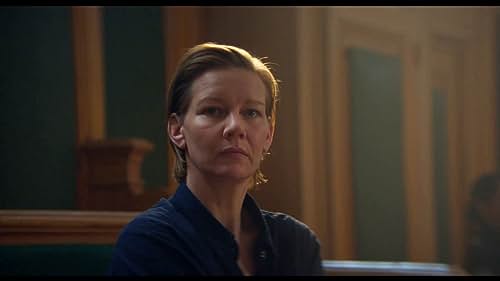
Relationships can be messy and complicated. The success, or failure, of a connection can be attributed to many factors with both parties involved playing their part in the outcome. Assigning blame isn’t always so straightforward as a new French film uses a courtroom trial to demonstrate. Anatomy of a Fall follows a family of three in France, writers Sandra (Sandra Hüller) and Samuel (Samuel Theis) and their young son Daniel (Milo Machado Graner), who was partially blinded in an accident as a younger child. The film begins with Sandra being interviewed by graduate student Zoé (Camille Rutherford), until their conversation is quickly cut short by Samuel blaring music in the attic (hilariously, an instrumental version of P.I.M.P. by 50 Cent) that makes it impossible for them to talk. Once the interview ends, Daniel goes outside to walk the dog while Sandra goes upstairs to her room. Once Daniel returns, he sees his dad’s dead body lying outside of the attic window, having fallen. Or was he pushed? French investigators believe so and a year later, so begins Sandra’s trial for his murder.
While Anatomy of a Fall is a courtroom drama at its core, but the questions that it presents to the audience extend past a mere question of guilt for its characters and delve into a psychological study of the slow deterioration of a marriage and the perception from outsiders about private trials and tribulations and ultimately, just who is at fault. At the trial for Samuel’s murder, the depths to which his marriage to Sandra had fallen are slowly revealed to the audience as we learn of his personal struggles with mental health, his professional struggles particularly when juxtaposed to Sandra’s success, the looming guilt he carried over his role in the blinding of Daniel and of Sandra’s previous cheating, her history of violence against Samuel, and her resentment over being forced to move back to his hometown in rural France. The disputes that the couple have and allow to fester and linger seem typical on their face for a marriage on the rocks, but developed into an explosive bomb once a questionable death is thrown into the mix.
As the facts behind their relationship unfold amidst the intense courtroom examination scenes, the audience is asked not only to judge for themselves whether these issues lead to Sandra being capable of murder, but also to question the path of their marriage and who was at fault for things falling apart so thoroughly. Was Samuel being passive aggressive in how he reacted to Sandra using the excerpt from his shelved book to write a successful one of her own, or was Sandra at fault for taking it from him? Was Sandra not supportive enough of Samuel’s professional struggles and dissatisfaction with his return to teaching or was her moving to France to appease Samuel support enough? Justine Triet’s script and direction do well in not answering these questions for the audience, but instead simply presenting the facts and letting viewers come to their own conclusions. The answers don’t come easy or even clearly, but this mirrors the downfall of such relationships as the reasons for them ending aren’t always clear-cut either.
This large runway for interpretation plays out onscreen in addition to in the audience as the public surrounding Sandra and Samuel are left to also interpret their actions in an effort to determine fault between Sandra and Samuel, and ultimately, Sandra’s guilt or innocence. For instance, was Samuel merely enjoying a song he liked and often played at high volume, even when Sandra wasn’t being interviewed by an attractive young woman like the ones she had cheated on him with previously? Or was his selection of P.I.M.P. a passive aggressive way of making a misogynist point as her defense counsel would present at her trial? Was Sandra’s use of his discarded novel idea innocent or just another example of her using her husband? The muddied way in which these actions can be viewed is an effective examination of how subjective our actions can become depending on amidst a shift in circumstances. What were once innocent acts like enjoying music can be looked at in a different light once drastic changes occur.
Anatomy of a Fall is a deep dive into modern relationships and how career, sexual proclivities, and culture can drive a wedge in-between a relationship. The film is completely cerebral and combined with a runtime a little over two and a half hours, it can feel longer than it needed to be. The acting from the cast is intense and well-done, encapsulating a family in crisis and how love and distrust can often be at odds with one another.
Image: NEON

